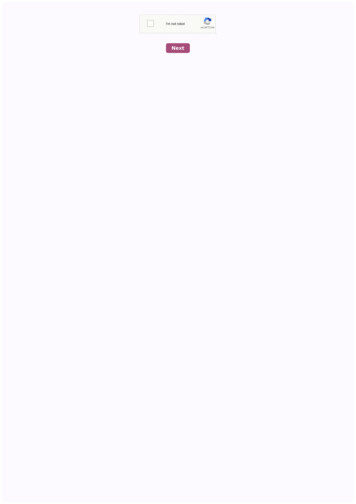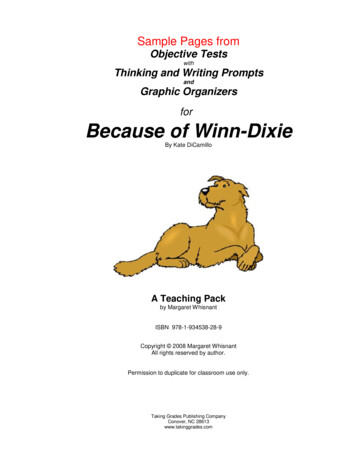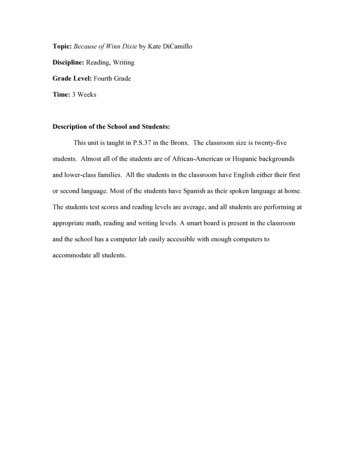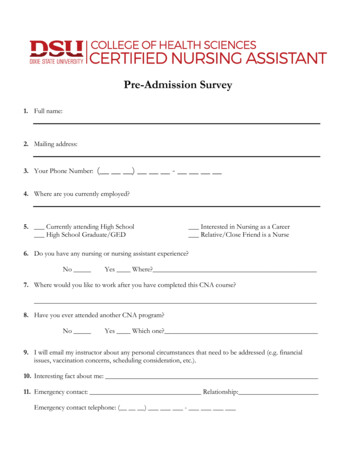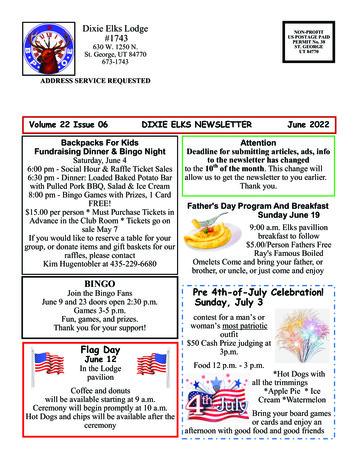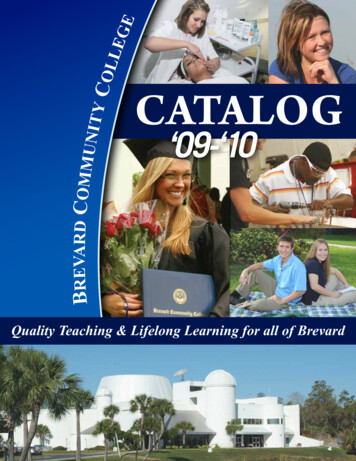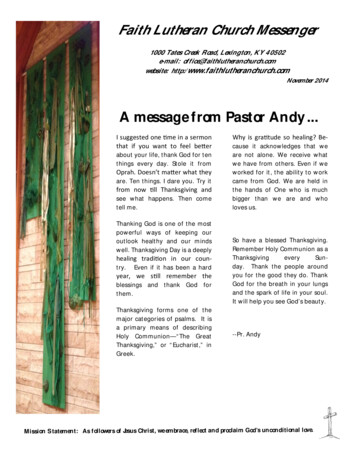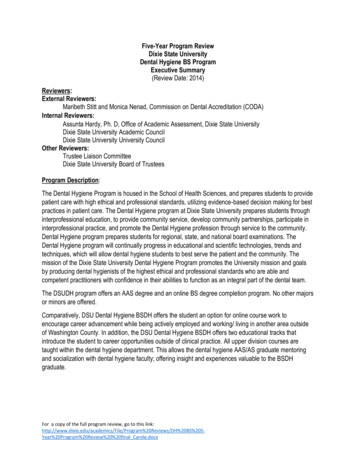
Transcription
Five-Year Program ReviewDixie State UniversityDental Hygiene BS ProgramExecutive Summary(Review Date: 2014)Reviewers:External Reviewers:Maribeth Stitt and Monica Nenad, Commission on Dental Accreditation (CODA)Internal Reviewers:Assunta Hardy, Ph. D, Office of Academic Assessment, Dixie State UniversityDixie State University Academic CouncilDixie State University University CouncilOther Reviewers:Trustee Liaison CommitteeDixie State University Board of TrusteesProgram Description:The Dental Hygiene Program is housed in the School of Health Sciences, and prepares students to providepatient care with high ethical and professional standards, utilizing evidence-based decision making for bestpractices in patient care. The Dental Hygiene program at Dixie State University prepares students throughinterprofessional education, to provide community service, develop community partnerships, participate ininterprofessional practice, and promote the Dental Hygiene profession through service to the community.Dental Hygiene program prepares students for regional, state, and national board examinations. TheDental Hygiene program will continually progress in educational and scientific technologies, trends andtechniques, which will allow dental hygiene students to best serve the patient and the community. Themission of the Dixie State University Dental Hygiene Program promotes the University mission and goalsby producing dental hygienists of the highest ethical and professional standards who are able andcompetent practitioners with confidence in their abilities to function as an integral part of the dental team.The DSUDH program offers an AAS degree and an online BS degree completion program. No other majorsor minors are offered.Comparatively, DSU Dental Hygiene BSDH offers the student an option for online course work toencourage career advancement while being actively employed and working/ living in another area outsideof Washington County. In addition, the DSU Dental Hygiene BSDH offers two educational tracks thatintroduce the student to career opportunities outside of clinical practice. All upper division courses aretaught within the dental hygiene department. This allows the dental hygiene AAS/AS graduate mentoringand socialization with dental hygiene faculty; offering insight and experiences valuable to the BSDHgraduate.For a copy of the full program review, go to this inal Carole.docx
Data Form:R411 Data TableDepartment or Unit—Dental Hygiene**Faculty - *Headcount is for the BSDH degreeonlyHeadcountWith Doctoral Degrees (Including MFA andother terminal degrees, as specified by theinstitution)Full-time TenuredFull-time Non-TenuredPart-timeWith Master’s Degrees – * The terminal degreein Dental Hygiene department is the Master’s ofScienceFull-time TenuredFull-time 12Year201300000433451211111111212211121211111With Bachelor’s DegreesFull-time TenuredFull-time Non-TenuredPart-timeOtherFull-time TenuredFull-time Non-TenuredPart-timeTotal Headcount Faculty *All BS faculty alsoteach in AAS programFull-time TenuredFull-time Non-TenuredPart-time0000044557121121221131231FTE (A-1/S-11/Cost Study Definition) *BSprogram data onlyFull-time (Salaried) *Faculty teach inBoth BS and AASTeaching AssistantsPart-time (May include 330.330.36For a copy of the full program review, go to this inal Carole.docx
Total Faculty FTE **University statusdecreased FT workloadNumber of GraduatesCertificatesAssociate DegreesBachelor’s DegreesMaster’s DegreesDoctoral DegreesNumber of Students—(Data Based on FallThird Week)Semester of Data: Fall, 2009-2013 * AAS andBS data combinedTotal # of Declared MajorsTotal Department FTE*Total Department SCH**Per Department Designator PrefixStudent FTE per Total Faculty FTECODA mandates a 5:1 student to instructorratio for AAS program clinicCost (Cost Study Definitions)Direct Instructional ExpendituresCost Per Student 006.236.486.95.915.88 556,351 779,175 717,318 661,906 733,864 8930 10,928 10,835 10,976 12,231FundingAppropriated Fund 375,480 466,678 350,613 391,682 423,381Other:Special Legislative AppropriationGrants of ContractsSpecial Fees/Differential Tuition 180,871 312,497 366,705 270,224 310,483Total 556,351 779,175 717,318 661,906 733,455**DSU Office of Institutional Research does not separate AAS and BS program expenses.Program Assessment:Student Achievement – Indicators, Assessment, and Analysis: The DSUDH BS completion program learningoutcomes are each addressed at an Introductory (I) or Developing (D) level throughout the curriculum toensure students are progressively and appropriately prepared to demonstrate Mastery (M) level in theSenior Project Capstone course in order to qualify for graduation. All DSU Core Themes are supportedthrough the DSUDH BS course work.With the national environment of health care reform, patient/client demographic changes and the desire toprovide an inter-professional educational experience for the student, program goals and learning outcomeswere modified. The change precipitated a review of the curriculum. It was decided that the education trackFor a copy of the full program review, go to this inal Carole.docx
has need of additional content in diversity and inclusion course objectives and content. This will beimplemented during the 2014-2015 academic year.The average time-to-degree for students in the BS program is one year. The graduates from the DSUDental Hygiene program have experienced a 100% employment in their field of study over the last fiveyears.Faculty assessment and student self-assessment indicates the BS program graduates are masteringProgram Learning Outcomes. DSU BS program graduates are successfully accomplishing the prescribedgoals and learning outcomes.Following program review meetings, student learning outcomes were changed last year to reflectdepartment goals and student needs. The assessment measurement instrument (Capstone Senior Project)was revised at the time and a new rubric implemented.Program Strengths and Challenges – Self-Evaluation:The strengths of the program are as follows: All courses are online and can be completed by working professionals locally and at a distance.All courses are taught by terminally-degreed faculty with online instructional training.Students may choose from two educational tracks to accommodate different professional interests.The program provides enough institutional residency credits for non-Dixie AAS graduates.The weaknesses of the program are as follows: Out of state tuition for online courses deters students who have degree opportunities at otherinstitutions that do not charge out of state tuition for online courses.DSU general education requirements may deter students from coming to DSU.The necessity of teaching two tracks to accommodate institutional residency for non-Dixie studentsmakes it difficult to achieve minimum enrollment goals for individual track specific courses.The greatest challenge to expanded enrollment in the DSU DH program is the out of state tuition. Thismakes it very difficult to recruit non-Utah residents since other Dental Hygiene BS completion programscharge in state tuition.External Review Summary: Only those standards that warrant comment are included; in all other cases,the visiting committee found that the program met or exceeded the minimum standards.At the time of the site visit, the accreditation status for the dental hygiene education program was “approvalwithout reporting requirements.”For a copy of the full program review, go to this inal Carole.docx
At the time of the Commission’s last evaluation of the program in November 2007, one recommendationwas cited in the area of Administration, Faculty and Staff. During this evaluation, the visiting committeereviewed this area and found that the program has maintained compliance with the previously citedrecommendation.Standard 1. Institutional Commitment and Program EffectivenessBased on a review of the formal and ongoing outcomes assessment process and student achievementmeasures, the visiting committee found the program has demonstrated positive student achievementoutcomes through Dental Hygiene National Board Exam and Western Region Examining Board pass rates.Program administration noted that although the state of Utah does not permit dental hygiene expandedfunctions, the program teaches this curriculum in order to prepare graduates to take the WREB Restorativeexamination. Up to this point, the program has not achieved the desired pass rate for this exam. Programadministration made a change in course instructors and provided them training via the WREB educator’sforum. This change has resulted in improved student satisfaction levels with the related curriculum as wellas a greater pass rate.Program assessment results are reviewed on an annual basis during faculty, curriculum review, andadvisory board meetings.Standard 2. Educational ProgramThe Dental Hygiene Associate of Applied Science curriculum must include content in the following fourareas: general education, biomedical sciences, dental sciences and dental hygiene science. This contentmust be integrated and of sufficient depth, scope, sequence of instruction, quality and emphasis to ensureachievement of the curriculum's defined competencies. A curriculum document must be submitted for eachcourse included in the dental hygiene program for all four content areas.Foundational knowledge should be established early in the dental hygiene program and of sufficient scopeand depth to prepare the student to achieve competence in all components of dental hygiene practice.Content identified in each subject may not necessarily constitute a separate course, but the subject areasare included within the curriculum.Curriculum content and learning experiences should provide the foundation for continued formal educationand professional growth with a minimal loss of time and duplication of learning experiences. Generaleducation, social science, and biomedical science courses included in the curriculum should be equivalentto those offered in four-year colleges and universities.General education content must include oral and written communications, psychology, and sociology.Through review of the self-study document, documents provided on-site and on-site interviews, the visitingcommittee identified the program requires applicants to complete a course in either psychology orsociology, but not both. The visiting committee noted some courses in the curriculum contain competenciesrelated to psychology and sociology, however the visiting committee determined the content is not taught toan appropriate level, scope and depth for post- secondary education. Additionally, the visiting committeeidentified the program requires two courses in written communications, but does not require an oralcommunications course. The visiting committee noted that several courses in the curriculum incorporateaspects of oral communications instruction. It is suggested the program review the program curriculum asFor a copy of the full program review, go to this inal Carole.docx
needed to ensure coordination of all content in oral communication and achievement of the curriculum’sdefined competencies.1. It is recommended that general education content include psychology, and sociology. (DHStandard 2-8a)Biomedical science content must include content in anatomy, physiology, chemistry, biochemistry,microbiology, immunology, general pathology and/or pathophysiology, nutrition and pharmacology.Through review of the self-study, documents provided on-site, and on-site interviews, the visiting committeedetermined the program does not require a course in biochemistry although several courses in thecurriculum incorporate aspects of biochemistry principles. It is suggested the program ensure thatinstruction of appropriate scope and depth comparable to college transferable liberal arts course work beincorporated in the curriculum to ensure achievement of the curriculum’s defined competencies.Recommendations, Plans and Improvements: The Commission on Dental Accreditation site visitresulted in one recommendation which was to make both sociology and psychology mandatory programprerequisite courses. In the past, students were allowed to choose one or the other. A request for changingthe program prerequisite requirement to include both sociology and psychology has been made to theUniversity Curriculum Committee.Options for increasing biochemistry and oral communications content have been discussed. It is proposedthat additional teaching modules on biochemistry be added to the oral microbiology course in order toinclude more instruction in biochemistry. It is proposed that additional teaching modules on oralcommunications be added to the second semester of the community oral health course in order to includemore instruction in oral communications. Both of those course instructors are redesigning course content toinclude the suggested material.Institution’s Response:DSU’s administration congratulates the Dental Hygiene department for its efforts in preparing DSU DentalHygiene students to meet their educational goals, especially in helping students prepare for their NationalBoard Dental Hygiene Examination (NBDHE). DSU students have consistently scored above the nationalaverage, and this past year, DSU students’ overall NBDHE score ranked in the 95 th percentile (15 out of300). All program graduates are licensed to practice, and although the job market for dental hygenists iscurrently tight, all DSU graduates have jobs in their field.The adminstration also thanks the Dental Hygiene faculty for addressing the one recommendation and twosuggestions highlighted by their external evaluator, Commission on Dental Accreditation Site Reviewers forthe AAS Dental Hygiene Program. According to the external evaluators, it was recommended that generaleducation content include a psychology course and a sociology course, rather than giving students theoption to complete one course or the other. The Dental Hygiene department proposed to incorporate bothsociology and psychology courses as prerequisite courses as the minimum degree requirements for theAAS degree in Dental Hygiene. The proposed changes were approved by the School of Health SciencesFor a copy of the full program review, go to this inal Carole.docx
Curriculum Committee and the University Curriculum Committee, and will be reflected in the Fall 2015catalog.One of the external evaluators’ suggestions was to increase oral communication content across thecurriculum. Although several courses in the curriculum currently incorporate aspects of oralcommunications instruction, the Dental Hygiene faculty decided to add teaching modules on oralcommunications to the second semester of the community oral health course in order to include moreinstruction in oral communications. Course instructors are currently redesigning course content andrevising the syllabi accordingly.A second suggestion was to increase biochemistry content across the curriculum. Following an exhaustivereview of courses, the faculty decided to add teaching modules on biochemistry to the oral microbiologycourse in order to include more instruction in biochemistry. Course instructors are currently redesigningcourse content and revising the syllabi accordingly.In reviewing the five-year plan set forth by the Dental Hygiene faculty, the administration agrees that theprimary focus should be to propose a restructure of the AAS curriculum that would enable AAS students tocomplete the BS degree concurrently. This type of restructuring would enable students to complete theirdegree in a shorter period of time (5 semesters, after prerequisites) while increasing their qualifications.Given changes in laws and the national trend to increase the minimum qualifications for dental hygenists (inthat they may become mid-level providers), a restructure of the DSU Dental Hygiene program will attractstudents throughtout the state and region, thereby increasing diversity and impact of the program.The administration congratulates the department on its leadership and forward thinking in better servicingDSU students by already teaching expanded functions. One recommendation is to make certain that thefaculty is adequately qualified and trained to teach the higher level qualifications. Adminstration advises thefaculty to slowly continue to build the program, monitor it closely, and find ways to scale the program. Forthe short term, given the change in the number of faculty members available to teach in the program andthe potential program restructure, it is recommended that student enrollment remain capped at 20 students,and eventually increase to capacity (24 students).Given that resources in higher education are always scare, the administration appreciates the efforts on thepart of the Dental Hygiene leadership to form alliances with others in the state (e.g., Utah health coalitions)to encourage donations to the program. The administration advises the Dental Hygiene department toapply other creative ways to find funding to overcome financial challenges (e.g., tuition cost differentialsand enrollment for the online degree completion program, support staff salaries and special equipmentneeds). For example, student fees can be increased to meet the needs for special equipment. Theadministration suggests that the faculty do a comparative study and see what the tuition and fees are like atother institutions, and consider charging differential tuition. DSU is a low cost institution, which can be anadvantage. Tuition can be increased and still be competitively priced.Overall, the adminstration commends DSU’s Dental Hygiene Department for its hard work. Theadministration would like to especially recognize the Dental Hygiene Department for its efforts to serve thecommunity with the mobile clinic. DSU is pleased with the competent leadership and the progress thedepartment is making, and the administration looks forward to the future of the programFor a copy of the full program review, go to this inal Carole.docx
The Dental Hygiene Program is housed in the School of Health Sciences, and prepares students to provide patient care with high ethical and professional standards, utilizing evidence-based decision making for best practices in patient care. The Dental Hygiene program at Dixie State University prepares students through interprofessional education, to provide community service, develop community .
